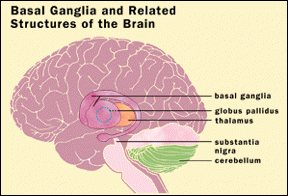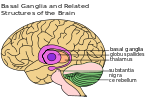 |
This is a file from the Wikimedia Commons. Information from its description page there is shown below.
Commons is a freely licensed media file repository. You can help.
|
 |
File:Basal Ganglia and Related Structures.svg is a vector version of this file.
It should be used in place of this raster image when superior.
File:Brain structure.gif  File:Basal Ganglia and Related Structures.svg
For more information about vector graphics, read about Commons transition to SVG.
There is also information about MediaWiki's support of SVG images.
|
|
| Description |
English: Basal Ganglia and Related Structures of the Brain
|
| Date |
July 1998 |
| Source |
Henkel, John (July-August 1998). " Parkinson's Disease: New Treatments Slow Onslaught of Symptoms". FDA Consumer: p. 17. ISSN 0362-1332. Retrieved on 2009-07-23. |
| Author |
John Henkel, FDA staff writer |
Permission
( Reusing this file) |
| Public domainPublic domainfalsefalse |
 |
This work is in the public domain in the United States because it is a work prepared by an officer or employee of the United States Government as part of that person’s official duties under the terms of Title 17, Chapter 1, Section 105 of the US Code. See Copyright. Note: This only applies to original works of the Federal Government and not to the work of any individual U.S. state, territory, commonwealth, county, municipality, or any other subdivision. This template also does not apply to postage stamp designs published by the United States Postal Service since 1978. (See 206.02(b) of Compendium II: Copyright Office Practices). It also does not apply to certain US coins; see The US Mint Terms of Use.
|
|
|
This file has been identified as being free of known restrictions under copyright law, including all related and neighboring rights.
|
|
File usage
The following pages on Schools Wikipedia link to this image (list may be incomplete):
This selection has made Wikipedia available to all children. SOS Children believes education is an important part of a child's life. That's why we ensure they receive nursery care as well as high-quality primary and secondary education. When they leave school, we support the children in our care as they progress to vocational training or higher education. There are many ways to help with SOS Children.






